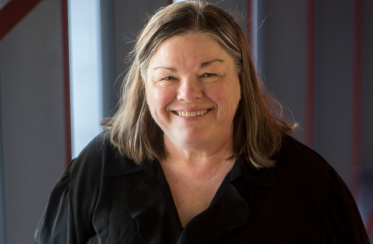Hope Happens Here: Nurse Linda
Join Our Movement
What started as an idea has become a national movement. With your support, we can influence policy and inspire lasting change.
Become an Advocate
Bernadette Mauro, Director of Information and Resource Services at the National Paralysis Resource Center, describes Schultz’s impact on the Reeve Foundation and the spinal cord community as “priceless.”
“We have people calling from Australia to talk with Linda,” Mauro said. “Her information is clear and concise, and people need that. And her compassion, warmth and empathy make her a natural fit for this community.”
For Schultz, nursing has been a lifelong mission. Her father battled brain cancer for much of her childhood; watching nurses care for him shaped her desire to help others. She joined the nursing club in high school and volunteered as a candy striper at the local hospital. After college, while working at the Rehabilitation Institute of Chicago, Schultz began to specialize in spinal cord injuries.
“I found my place early on,” she says.
Eventually, Schultz landed at Washington University’s pioneering activity-based therapy program for spinal cord injuries led by Dr. John McDonald. One day, during a staff meeting, McDonald spoke about the challenge he and others in the program were having connecting with Christopher Reeve. McDonald believed the program could help him; the only problem was that no one could get Reeve on the phone.
After the meeting, Schultz returned to her office with a thought: Why not reach out to Reeve’s nurse? She picked up the phone and called the Reeve Foundation. Within minutes, she had been connected with Reeve’s nurse, and moments later was speaking with Reeve himself.
“If you only knew it was the day that was going to change your life, you’d circle it on the calendar,” Schultz.
She arranged a meeting with Reeve and McDonald, leading to Reeve’s participation in the program. As she helped coordinate his treatment over the next several years, Schultz was moved by Reeve’s advocacy on behalf of millions of people living with paralysis, but also his kindness; Schultz’s husband had sustained a disease-related spinal cord injury, and Reeve sometimes called him, providing a much-appreciated boost.
“His passion was contagious,” she says. “If there had never been Christopher Reeve, we would never be where we are today. He used his powers for good.”
Inspired by Reeve, Schultz hopes her work with the foundation continues to help the community.
“At first, families don’t know which way to turn,” she says. “But I want people to have hope, to know things are getting better. Research in spinal cord injuries is exploding. The care for people is better. There is hope for the future.”
To ask Nurse Linda a health-related paralysis question, tune in to her Reeve Foundation monthly webinar on the last Wednesday of each month, or leave her a message on Reeve Connect at www.ChristopherReeve.org/nurse.
